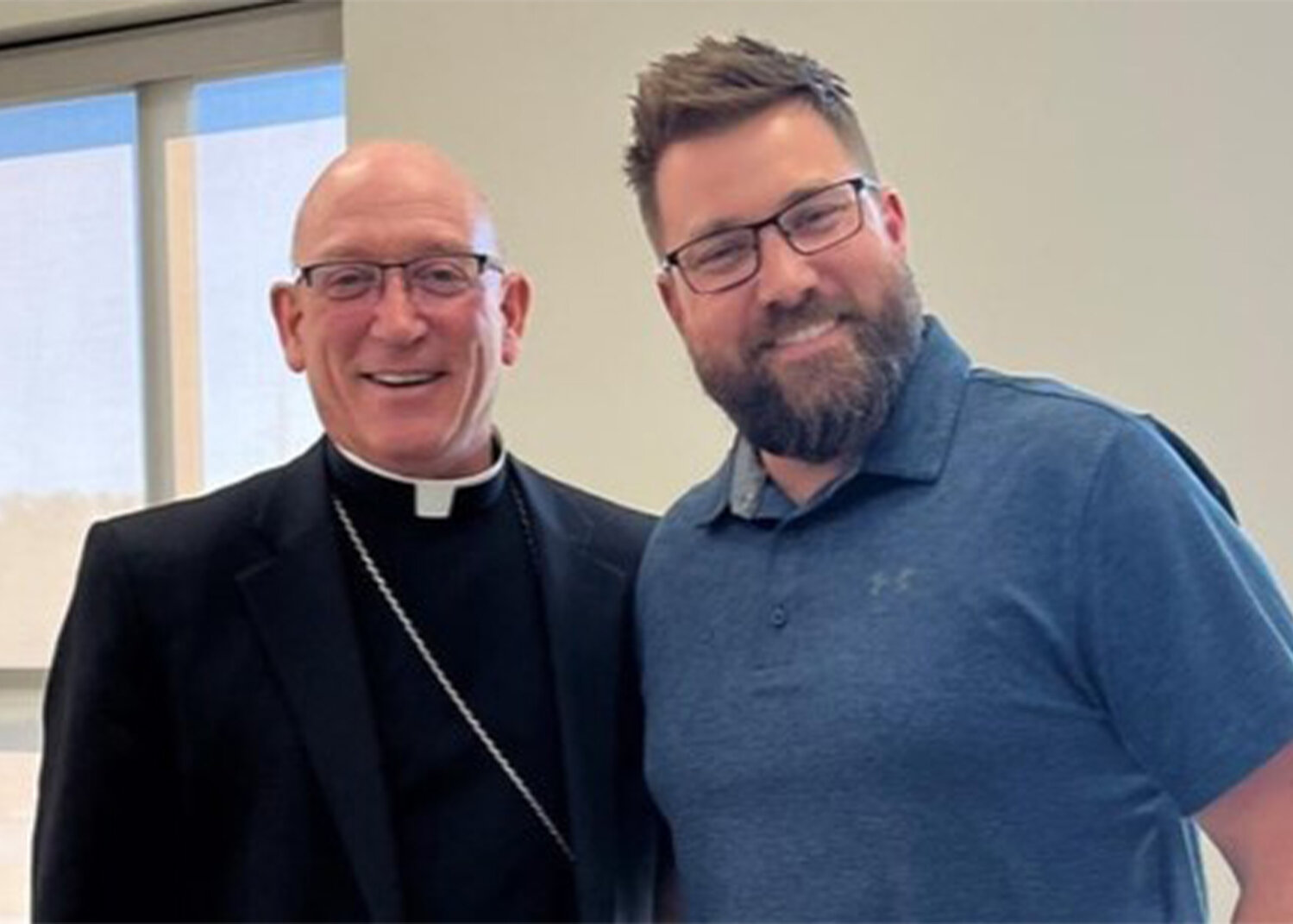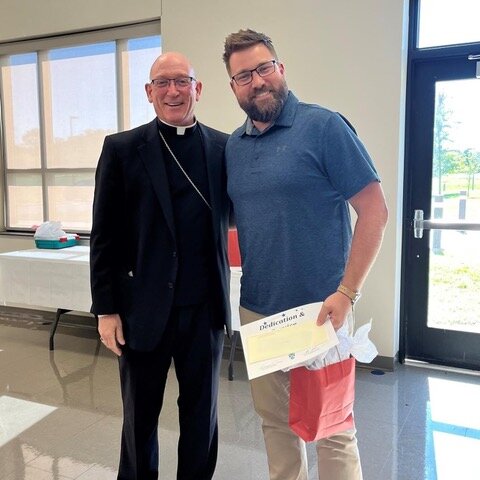J.C. native honored with his diocese’s Teacher of the Year award

Jefferson City native Cam Branson wants his students to be “unapologetically Catholic.”
He longs for them to grow up into people whose faith is readily recognizable in what they say and how they act.
“Once you’re out of your Catholic ‘safe zone,’ you need to be strong and courageous to be unambiguously Catholic,” noted Mr. Branson, a junior high math teacher at St. Agnes Cathedral School in Springfield.
He is the recipient of the Diocese of Springfield-Cape Girardeau’s 2023 Distinguished Teacher of the Year award.
Bishop Edward Rice of Springfield-Cape Girardeau presented the award to Mr. Branson at a diocesan faculty in-service in Joplin.
“It was very unexpected,” said Mr. Branson, a graduate of St. Joseph Cathedral School and Helias Catholic High School, both in Jefferson City.
His parents are Delbert and Joan Branson.
Mr. Branson has been teaching at St. Agnes since graduating from Missouri State University in Springfield 13 years ago.
Two longtime educators at St. Agnes are previous recipients of the award for the diocese, which spans all of southern Missouri: a first-grade teacher who recently retired after a half-century of imparting wisdom in her students, and an eighth-grade teacher who has been elevating her students’ minds and spirits for over 45 years.
“They are teachers I immediately looked up to when I first got into teaching — as in, ‘This is how you do it!’” Mr. Branson stated. “So, to be mentioned in the same conversation with them just blows me away.”
In fact, Mr. Branson grew up surrounded by great teachers who still give him inspiration.
“I was in good hands all through grade school, with good teachers who made it a safe place for me to learn, knowing that they all cared about me and wanted me to succeed,” he recalled of his years at the Cathedral school in Jefferson City.
“They were very good teachers and helped guide me by their example in the classroom,” he stated. “They influenced my understanding of what kind of teacher I should be.”
The faculty at Helias Catholic continued that witness for him throughout the four years following grade school.
“Helias held you to a high standard,” Mr. Branson noted. “I wasn’t the best student, but I did try my best to meet those standards. Because I know they weren’t asking me to do something they didn’t think I could do.”
Being at Helias Catholic also helped him explore and understand his faith at a deeper level and eventually learn to defend it from the common misconceptions he would inevitably encounter in college.
Other mentors came later, including an education instructor at Missouri State who recognized Mr. Branson’s potential, gave him a second chance and helped him become the teacher he is today.
Partnership with parents
Mr. Branson pointed out that after growing up in a part of central Missouri where Catholics are very much in the mainstream, it felt very different to go to college in the southeastern segment of the state, where there are fewer Catholics.
“Up there, you’re basically surrounded by it, and you don’t really have to ask questions about it. It just is!” he said.
He reiterated the Church’s insistence that parents are the primary educators of their children and are the first teachers of the faith.
Catechists and Catholic school teachers build on the foundation that parents give their children, in constant cooperation with those same parents and the rest of the faith community, he said.
“I’m a middle school math teacher,” he stated. “And you can see the students whose parents work with them at home. They’re generally more successful.”
He said that in that way, imparting the Catholic faith at home is much like helping children learn math.
“If you have questions, you do some research and you help your kids find the answers they’re looking for,” he stated.
“If you rely on it all getting done at school and then have (your children) go home to a lived experience that’s entirely separate from what they’re learning at school, what are they going to be able to get out of that?” Mr. Branson inquired.
He said he’s able to answer most of his students’ questions about Church teaching and their own budding relationship with God.
But not every question.
“We have a sheet of paper that I keep in my toolbox drawer that I teach from,” said Mr. Branson. “I write down the questions I don’t know the answer to. We save those questions for when our pastor comes to visit the class. He’s someone my students trust.”
Mr. Branson recalled that every teacher he had at St. Joseph Cathedral School and Helias Catholic understood their role as a Catholic educator.
“Even if they weren’t Catholic, they realized that their duty was to impart and strengthen the faith through whatever lessons they were teaching us,” he said.
That’s something Mr. Branson sets out to emulate every day he’s in the classroom.
Without apology
Mr. Branson predicted what his students will be like 10 years from now if he and his fellow Catholic school educators are successful in their mission.
“If we do our job well, they’ll come out of the Catholic school system with a strong Catholic foundation that they’ll able to use whatever gifts God has given them to the best of their ability and continue being unapologetically Catholic,” he stated.
“Mindful that all of our students are very unique and have received different gifts from God, they’ll be serving their family, their community and showing their faith in the way that God intended them,” he said.
Mr. Branson asked for prayers for him and all Catholic school educators to show their faith fully while teaching — “basically, incorporating our faith and educational knowledge into our daily lessons.”
“We want the kids to be able to see that we’re living and practicing our faith,” he said.
And for his students, he suggested praying for something Bishop Rice often talks to them about: “being unapologetically Catholic.”
“Namely, being able to spread the faith,” said Mr. Branson. “Having the strength to say out loud that they’re Catholic and proudly raising their hand among friends and peers.”
It feels safe to do that in a Catholic environment with other Catholic students, but the world is much larger and more diverse.
“So, I would pray for the students to learn to be unapologetically Catholic at a young age, so when they get older and are not surrounded by Catholics and a strong Catholic family at that time, they have the strength to proclaim proudly that they’re Catholic in what they say and what they do,” said Mr. Branson.
Comments
Other items that may interest you
Services
The Catholic
Missourian
2207 W. Main St.
Jefferson City MO 65109-0914
(573) 635-9127
editor@diojeffcity.org







